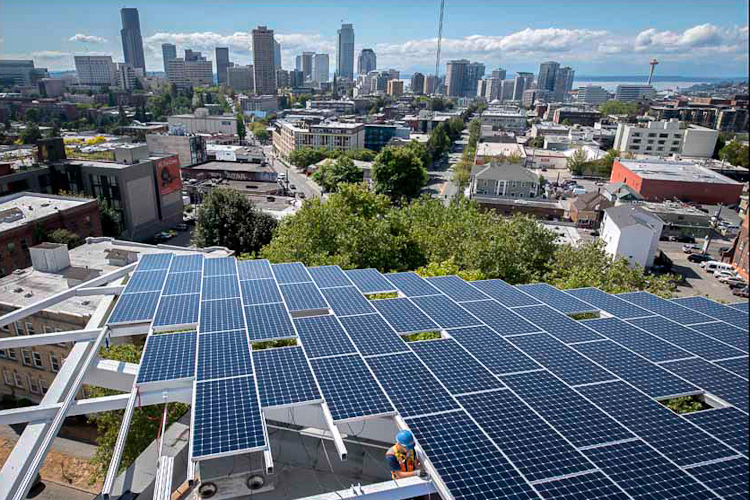When you think of an environmental hero, a plumber might not be the first person who comes to mind. But this year, a union representing plumbers and pipefitters earned a “champion” award from a nationwide coalition of environmental and labor groups called the BlueGreen Alliance.
The work of plumbers like Harold Harrington is a big reason the union took home the top honor. Harrington belongs to United Association Local 370 in Flint, Michigan. And during the lead water crisis there, his members volunteered to go door to door and replace faucets and water filters in people’s homes.
“We replaced 650 faucets, just because the filters wouldn’t fit the old faucets,” Harrington says. “And they’re carbon filters, so they do remove lead.”
LISTEN: “How Labor and Environmental Groups Are Building Common Ground”
Leaders in both the environmental and labor movements say the country could prevent more public health disasters like the one in Flint if old infrastructure is fixed or replaced. That would include things like updating water systems and fixing leaking natural gas pipelines in American cities. And at the same time, those repairs would create jobs.
Some new regulations recently passed in California offer a prime example, according to Michael Brune, executive director of the Sierra Club. The new rules were created in response to a four-month leak of methane—a potent greenhouse gas—from a natural gas storage facility near Los Angeles.
“There will be a survey of the state’s natural gas infrastructure,” Brune says. “Some of the areas that are most vulnerable to leaks will be detected, and those pipes will be repaired and replaced. And there will be lots of jobs, and there will be a cut in the pollution from these pipelines.”
And that kind of project is what is increasingly bringing environmentalists and labor unions together. Fixing the pipelines and infrastructure helps both their causes.
Admittedly, Brune says, when it comes to natural gas infrastructure, the alliance between labor and environmentalists can become a bit tricky.
“At the same time, we can’t rely on fossil fuels,” Brune says. “And so we have to begin to get off of natural gas and all fossil fuels.”
Traditionally, some unions—especially those representing construction workers—have opposed partnerships with environmentalists, especially when jobs from the extraction and transport of fossil fuels are at stake.
Case in point: the hotly contested Keystone XL pipeline, which promised to transport natural gas from Canada, through the United States, to the Gulf of Mexico. Environmentalists fought against it; labor and construction unions advocated for the pipeline because of the jobs. But the Sierra Club’s Michael Brune isn’t worried.
“Disagreements abound in life,” he says. “What we’ve found through the BlueGreen Alliance is that on most of the issues, we have a strong affinity and an ability to work through our disagreements.”
“Disagreements abound in life. What we’ve found through the BlueGreen Alliance is that on most of the issues, we have a strong affinity and an ability to work through our disagreements.”
One area where they don’t have a problem—growth in the green energy sector.
Just days before this year’s BlueGreen Alliance conference in Cleveland, the U.S. Department of Energy announced it would give a local nonprofit $40 million to build the country’s first offshore freshwater wind project in Lake Erie.
“That’s going to allow that project to go forward with a bang,” says Harriet Applegate, a leader with the AFL-CIO in Cleveland. “That’s a big, big deal. Freshwater wind is a new thing, so I’m confident there’s going to be lots of jobs.”
Applegate says projects like this help change labor’s attitudes toward environmental groups. She says even coal workers are coming around.
“I know the utility workers—officially and unofficially—do not blame the environmental movement for the closure of the coal plants. That is definitely different than the old days. It used to be that it was ‘those nasty environmentalists,’ and I think that’s a sea change.”
Another sea change: Global warming is now a big issue for some labor unions. United Steelworkers International President Leo Gerard says they’ve understood for decades the capacity of climate policy to help both the environment and manufacturing.
“We need to make wind turbines at home, we need to make solar panels at home, we need to do geothermal at home, we need to retrofit our buildings,” Gerard says. “So there are millions of jobs to be created in infrastructure. We just need to elect the right people.”
For Gerard’s union, the right people are Democrats. The United Steelworkers just announced its endorsement of Hillary Clinton for president—as did the AFL-CIO, the country’s largest labor federation. But according to some analysts, Donald Trump’s populist campaign could have the edge among rank-and-file workers.

